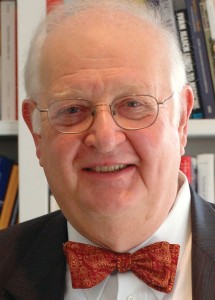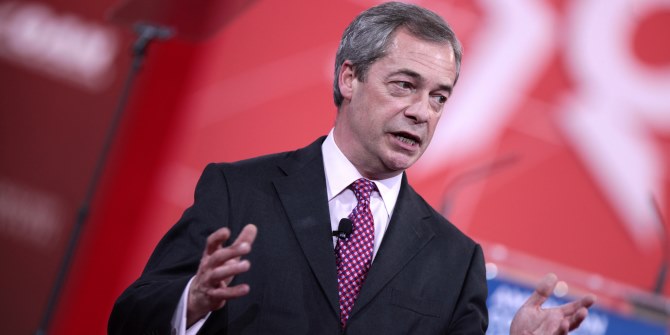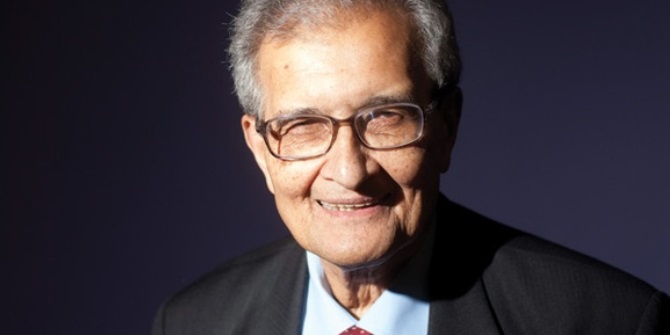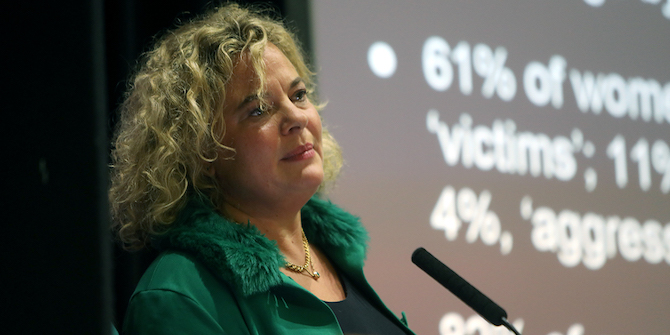 Angus Deaton recently came to the LSE to discuss his new book, The Great Escape: Health, Wealth and the Origins of Inequality. Here he discusses his arguments regarding the usefulness of foreign aid and our moral obligation for reducing poverty and ill health in the world.
Angus Deaton recently came to the LSE to discuss his new book, The Great Escape: Health, Wealth and the Origins of Inequality. Here he discusses his arguments regarding the usefulness of foreign aid and our moral obligation for reducing poverty and ill health in the world.
In your new book you write that “foreign aid is doing more harm than good and it is undermining countries’ chance to grow”. Can you explain your argument?
The dominant fact for me about most poor countries is that the social contract, the contract between the government and the governed, is not there. It’s very weak and it’s very unsatisfactory and you know in many cases the government is preying on the people, not helping them. It’s what you call an extractive regime rather than a sort of helping, promoting regime. The problem is that if you’re in a country, say in Africa, where there are pretty weak institutions to begin with and you bring in a lot of foreign aid so that the leaders can run the country without ever consulting the voters or the public.
We have also got ourselves into the situation where the donors have to give money even more than the guys have to receive it. Because guys at the World Bank don’t get paid if they don’t shift the money! I think it’s much the same in the UK’s Department for International Development (DFID). I think they have very strong incentives to keep the aid flowing. Of course the people receiving it know that very well and they can behave badly and with impunity. I think that really does make this contract very fragile.
Let me clarify just a little bit though, the real point in my argument is that that mechanism is always there if you’re taking money into the country. It doesn’t mean that you wouldn’t necessarily want to do it if other things are strong enough. The strongest case is possibly that there’s millions of people alive today because of anti-retrovirals who’d otherwise be dead, and those are paid for by foreign aid essentially. Saving those lives counts for a lot, and maybe undermining the government in those circumstances is OK – but your still undermining the government so that’s really what I want to pay attention to.
And finally, “aid”, it’s become clear to me, is used in very different senses. So for instance, if we were in the United States or you here were to develop a new pharmaceutical that made it much easier to deal malaria. Some people would count that as foreign aid. But it doesn’t fall into my definition. My argument is to do with giving money to the country and undermining the government. You don’t do that when you invent a cure for malaria or a vaccine for HIV/AIDS.
Could you create conditions for the aid money that goes in? Ensure that it is focused in a way that improves upon or establishes institutions that aren’t there?
Well that’s the counter argument, I was at DFID recently and they were actually much more receptive than I thought they would be. Many of these arguments are fully familiar to them, which tells me that it’s a very good aid agency. They’re people who don’t have their heads buried in the sand.
People say, “we’re working really hard to improve institutions”. I’m a little bit sceptical that people from the outside can improve the institutions that a country should have. I give an example in the book of how would Americans react if the Swedish government came and said “we’ll pay for medicare for the next 50 years but you’ve got to legalise gay marriage and let all black people out of jail”. Of course when I was at Princeton I said that and everybody in the room said “I’ll go for that”. But the majority of Americans really would not be so keen on that.
There really is an issue about undermining sovereignty, especially in situations where the country may not have all that much choice. But on conditionality, I would love it, I think that conditionality would be great if you could make it stick but it’s just not credible because the inconstancy problems: once they misbehave you don’t actually want to do it. And secondly because there’s not just one aid agency, there’s thousands of them and if you don’t get it from the US you can get in from Germany or from Britain or from Australia – or in the end you can get it from China.
In your book’s introduction, you say: “Those of us who were lucky enough to be born in the right countries have a moral obligation to reduce poverty and ill health in the world”.
The moral obligation is important because I don’t want it to sound like I’m a heartless bastard who has no interest in this partly because there’s just this: these people are hurting and if you can help them you ought to help them. Secondly, some of their hurt is to do with us, you know the colonial programme was not a great success. It might have been a great success for the Brits, it was not a great success for what happened in India. So we owe them big.
I have students I meet at Princeton who come to me and say “I want to devote my life to making the world a better place” and “I want to dedicate my self to reducing global poverty” and I say there are two ways: one is impossibly hard but I know at least one person who did that, some other people have done it. You go to Sierra Leone, you go to India or wherever. You become a citizen, you use your skills to help local groups agitate. You don’t take any money from outside, you just become like them and you use the skills and knowledge you’ve learnt here to help them. My friend Jean Drèze is an activist in India who’s been incredibly successful in doing this. He had to renounce his Belgian citizenship, it was very hard for him to even get that done. He lives without money because he’s frightened of being compromised by that and he’s been enormously successful. But it’s like the camel going through the eye of the needle right? It’s hard.
The other thing I tell my students to do is go to Washington and tell them to stop selling arms to poor countries. These are very very articulate smart kids who are going to be national leaders and god knows what else. You may not think you have much power now but you really do – go and get high positions, go and put pressure on these bastards to stop doing this. There’s a lot of stuff about aid but not that much publicity for debt relief. What about publicity about Britain selling arms? Fighting on those causes is something that people in our, rich countries have the legitimacy and standing to do because they’re citizens of those countries.
Will the ‘Great Escape’, the recent exiting of many people in the world from the scourges of poverty and ill health, have a happier ending than the movie that inspired the metaphor?
I hope so! I think that I say that there are real threats there, global warming being the most obvious. But there are lots of political threats, from China, from the US. Things could go badly wrong. Bad politics has a long record of destroying human progress for long periods of time. So you want to worry about that. If you were a clear-eyed, reasonable but sceptical person you might easily think that this 250 years of progress could be just a flash in the pan, like what happened in China in the 11th century.
However, I think people always want to make the great escape and even if you have terrible setbacks, you can fill in all the tunnels but you can’t stop people knowing how to dig tunnels. Maybe you can eventually, maybe if you went back into the Stone Age people would forget how to forge documents or whatever you need to do to get out. But there’s an asymmetry there, which if you build some project and you don’t tend it the roads get all weeded up and you can’t use it after a while. But the knowledge that boiled water is safer than not boiled water is not going to evaporate in five minutes. Even if the world came to an end and we were all wandering around my mother would still be telling me to wash my hands!
 Angus Deaton – Princeton University Angus Deaton is the Dwight D. Eisenhower Professor of Economics and International Affairs at the Woodrow Wilson School of Public and International Affairs and the Economics Department at Princeton University. My main current research areas are in health, well-being, and economic development.
Angus Deaton – Princeton University Angus Deaton is the Dwight D. Eisenhower Professor of Economics and International Affairs at the Woodrow Wilson School of Public and International Affairs and the Economics Department at Princeton University. My main current research areas are in health, well-being, and economic development.








3 Comments